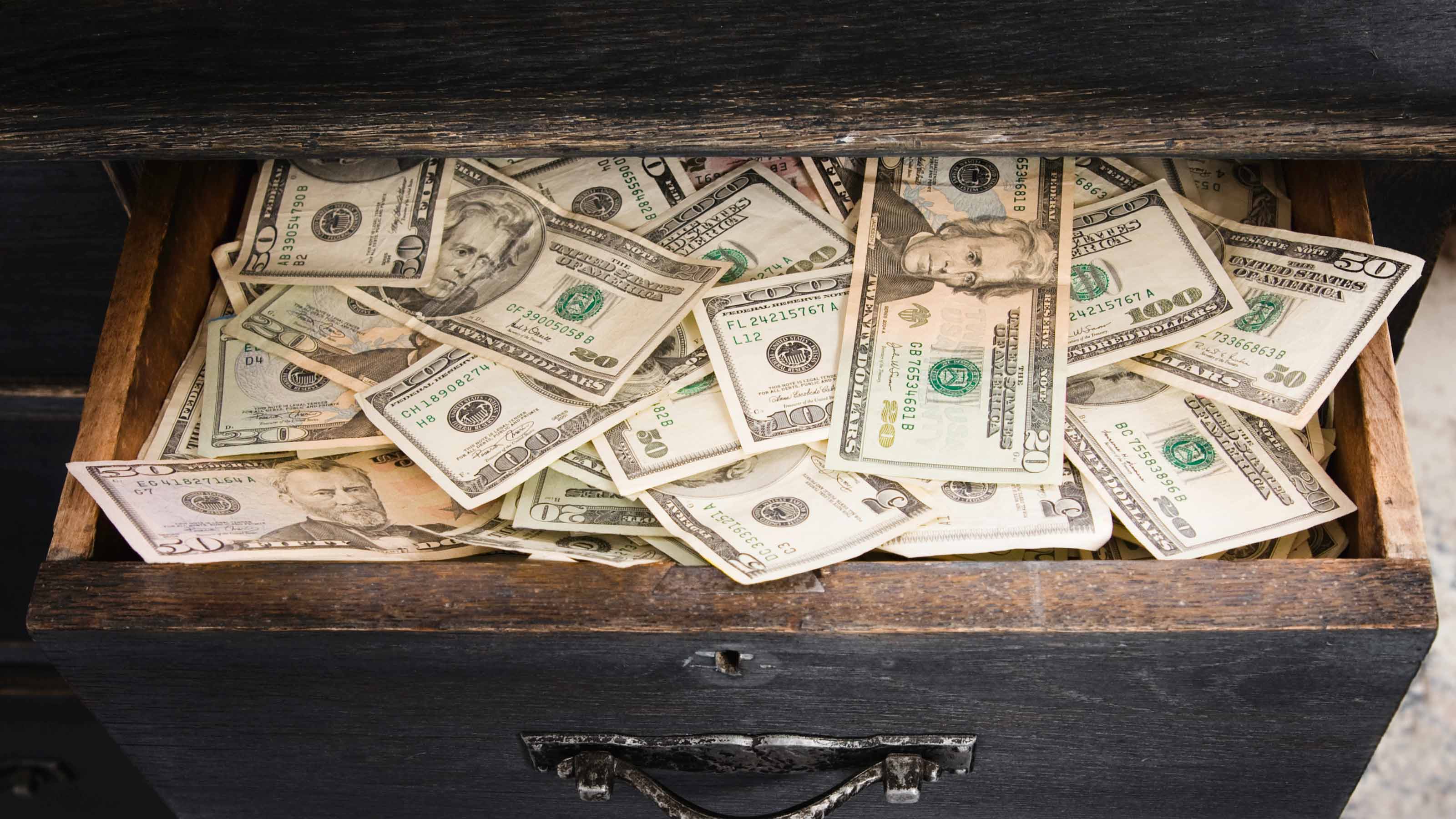It May Be Unsexy, But This One Asset Class Is Critical to Any Financial Plan
You can’t afford to forget about cash when planning for your wealth. Here are some guidelines to help manage this often-overlooked asset class.


Profit and prosper with the best of Kiplinger's advice on investing, taxes, retirement, personal finance and much more. Delivered daily. Enter your email in the box and click Sign Me Up.
You are now subscribed
Your newsletter sign-up was successful
Want to add more newsletters?

Delivered daily
Kiplinger Today
Profit and prosper with the best of Kiplinger's advice on investing, taxes, retirement, personal finance and much more delivered daily. Smart money moves start here.

Sent five days a week
Kiplinger A Step Ahead
Get practical help to make better financial decisions in your everyday life, from spending to savings on top deals.

Delivered daily
Kiplinger Closing Bell
Get today's biggest financial and investing headlines delivered to your inbox every day the U.S. stock market is open.

Sent twice a week
Kiplinger Adviser Intel
Financial pros across the country share best practices and fresh tactics to preserve and grow your wealth.

Delivered weekly
Kiplinger Tax Tips
Trim your federal and state tax bills with practical tax-planning and tax-cutting strategies.

Sent twice a week
Kiplinger Retirement Tips
Your twice-a-week guide to planning and enjoying a financially secure and richly rewarding retirement

Sent bimonthly.
Kiplinger Adviser Angle
Insights for advisers, wealth managers and other financial professionals.

Sent twice a week
Kiplinger Investing Weekly
Your twice-a-week roundup of promising stocks, funds, companies and industries you should consider, ones you should avoid, and why.

Sent weekly for six weeks
Kiplinger Invest for Retirement
Your step-by-step six-part series on how to invest for retirement, from devising a successful strategy to exactly which investments to choose.
If the past year and a half has taught us anything, it’s that having a good financial foundation is critical. While cash is such an important aspect of our everyday lives, many have become complacent about it, often overlooking it entirely as an asset class. Even if your priority is to grow your wealth, you need to build on a foundation of financial security. Cash is that foundation, offering you the comfort of knowing you can cover your monthly bills and unforeseen expenses.
With current interest rates so low, you may not even be thinking about your cash, but having a proper plan for it is a vital part of your financial health, and one that can add to your wealth in the long term.
As a financial planner who has helped hundreds of investors with their finances, I’ve seen a lot of money mistakes. One of the most common mistakes is clients trying to put too much of their wealth into non-liquid investments. While it’s tempting to aim for the biggest returns, this can lead to complications if unexpected events occur, like a job loss, larger-than-anticipated tax bill or even a global pandemic. Without easy access to cash, you may be forced to charge large amounts to your credit card or pull money from other accounts, incurring possible penalties or tax liabilities. You can avoid this simply by having a plan for your cash.
From just $107.88 $24.99 for Kiplinger Personal Finance
Become a smarter, better informed investor. Subscribe from just $107.88 $24.99, plus get up to 4 Special Issues

Sign up for Kiplinger’s Free Newsletters
Profit and prosper with the best of expert advice on investing, taxes, retirement, personal finance and more - straight to your e-mail.
Profit and prosper with the best of expert advice - straight to your e-mail.
The Basics: How to Make a Plan for Your Cash
I suggest structuring your cash in three tiers.
- The first tier: This layer is for your routine, recurring expenses. These are the predictable bills that come in every month. The amount you hold here is up to you: Some people keep the bare minimum and others prefer more of a cushion. Figure out the lowest number you’re comfortable with and make sure that amount is in your checking account every month.
- The second tier. This one is for larger planned expenses over the next 12-24 months, such as a car purchase, home repairs or a vacation. These are expenses you know are coming and can prepare properly for. Don’t be tempted to invest this cash while planning for these expenses, since it’s best to not take risks with money you know you’ll need. The goal should be to be able to pay for large expenses in full when the time comes. The amount of cash you set aside here may vary year to year, but these expenses are as important to consider as your immediate monthly expenses.
- The third tier. The last tier is your emergency fund, which should be enough to cover your expenses in the event you lose your job or experience another sudden expense. If you are younger, you may aim for three months of savings. If you are older or have a family, six months is ideal. This is money that is designed not to be spent, except in the event of a true emergency. Having this cash available can save you from financial catastrophe should the worst occur.
Where to Stash Your Cash
While tier one cash should be kept in a checking account, tiers two and three should be in savings accounts. Regardless of where you bank, you should consider leveraging online banks to earn the most on your cash. Online banks operate similarly to brick-and-mortar banks, just without the physical location. They’re FDIC-insured, and they have lower operating expenses, which means they pass along higher yields to you.
This will help prevent another common mistake I see, which is the acceptance of low interest rates. Because interest rates change so rapidly, it can be a full-time job to stay on top of the latest rates. A lot of my clients use MaxMyInterest, a cash management platform that automatically directs your funds from one online bank to the next based on which is paying the highest interest rate. This helps you earn the most possible on your cash while also keeping it liquid and accessible. While the money you earn may not be life-changing, over time it adds up – and I think we can all agree that earning more is better than earning less!
The Bottom Line
Cash may be less flashy than higher yield investments, but don’t underestimate its importance in building your wealth. If managed properly, your cash foundation should provide you with the safety and security to live comfortably. But if overlooked, it can be catastrophic to your financial well-being. Once your foundation is in place, you can then focus on building your wealth.
Whatever your income or stage in life, make sure your cash is working for you.
Profit and prosper with the best of Kiplinger's advice on investing, taxes, retirement, personal finance and much more. Delivered daily. Enter your email in the box and click Sign Me Up.

Derek Ripp, CFP® is a partner at Austin Wealth Management, a leading financial advisory team that works with families, executives and small-business owners to help them prepare a plan for the next phase of their financial lives. He helps families achieve financial independence and peace of mind. Derek lives in Wimberley, Texas, with his wife and two daughters. For more information, please visit https://austinwealthmgmt.com/.
-
 Nasdaq Leads a Rocky Risk-On Rally: Stock Market Today
Nasdaq Leads a Rocky Risk-On Rally: Stock Market TodayAnother worrying bout of late-session weakness couldn't take down the main equity indexes on Wednesday.
-
 Quiz: Do You Know How to Avoid the "Medigap Trap?"
Quiz: Do You Know How to Avoid the "Medigap Trap?"Quiz Test your basic knowledge of the "Medigap Trap" in our quick quiz.
-
 5 Top Tax-Efficient Mutual Funds for Smarter Investing
5 Top Tax-Efficient Mutual Funds for Smarter InvestingMutual funds are many things, but "tax-friendly" usually isn't one of them. These are the exceptions.
-
 Social Security Break-Even Math Is Helpful, But Don't Let It Dictate When You'll File
Social Security Break-Even Math Is Helpful, But Don't Let It Dictate When You'll FileYour Social Security break-even age tells you how long you'd need to live for delaying to pay off, but shouldn't be the sole basis for deciding when to claim.
-
 I'm an Opportunity Zone Pro: This Is How to Deliver Roth-Like Tax-Free Growth (Without Contribution Limits)
I'm an Opportunity Zone Pro: This Is How to Deliver Roth-Like Tax-Free Growth (Without Contribution Limits)Investors who combine Roth IRAs, the gold standard of tax-free savings, with qualified opportunity funds could enjoy decades of tax-free growth.
-
 One of the Most Powerful Wealth-Building Moves a Woman Can Make: A Midcareer Pivot
One of the Most Powerful Wealth-Building Moves a Woman Can Make: A Midcareer PivotIf it feels like you can't sustain what you're doing for the next 20 years, it's time for an honest look at what's draining you and what energizes you.
-
 I'm a Wealth Adviser Obsessed With Mahjong: Here Are 8 Ways It Can Teach Us How to Manage Our Money
I'm a Wealth Adviser Obsessed With Mahjong: Here Are 8 Ways It Can Teach Us How to Manage Our MoneyThis increasingly popular Chinese game can teach us not only how to help manage our money but also how important it is to connect with other people.
-
 Looking for a Financial Book That Won't Put Your Young Adult to Sleep? This One Makes 'Cents'
Looking for a Financial Book That Won't Put Your Young Adult to Sleep? This One Makes 'Cents'"Wealth Your Way" by Cosmo DeStefano offers a highly accessible guide for young adults and their parents on building wealth through simple, consistent habits.
-
 Global Uncertainty Has Investors Running Scared: This Is How Advisers Can Reassure Them
Global Uncertainty Has Investors Running Scared: This Is How Advisers Can Reassure ThemHow can advisers reassure clients nervous about their plans in an increasingly complex and rapidly changing world? This conversational framework provides the key.
-
 I'm a Real Estate Investing Pro: This Is How to Use 1031 Exchanges to Scale Up Your Real Estate Empire
I'm a Real Estate Investing Pro: This Is How to Use 1031 Exchanges to Scale Up Your Real Estate EmpireSmall rental properties can be excellent investments, but you can use 1031 exchanges to transition to commercial real estate for bigger wealth-building.
-
 Should You Jump on the Roth Conversion Bandwagon? A Financial Adviser Weighs In
Should You Jump on the Roth Conversion Bandwagon? A Financial Adviser Weighs InRoth conversions are all the rage, but what works well for one household can cause financial strain for another. This is what you should consider before moving ahead.